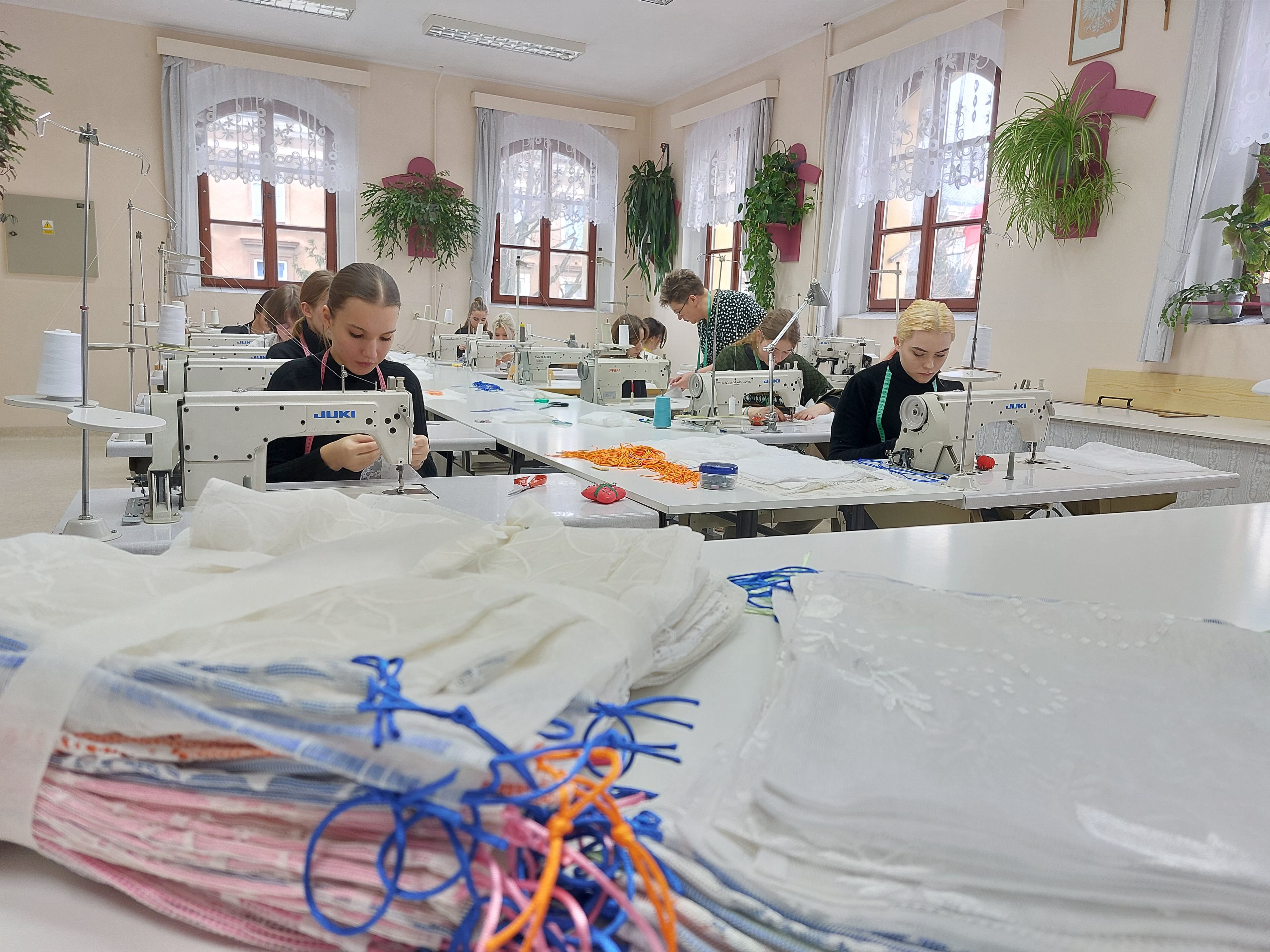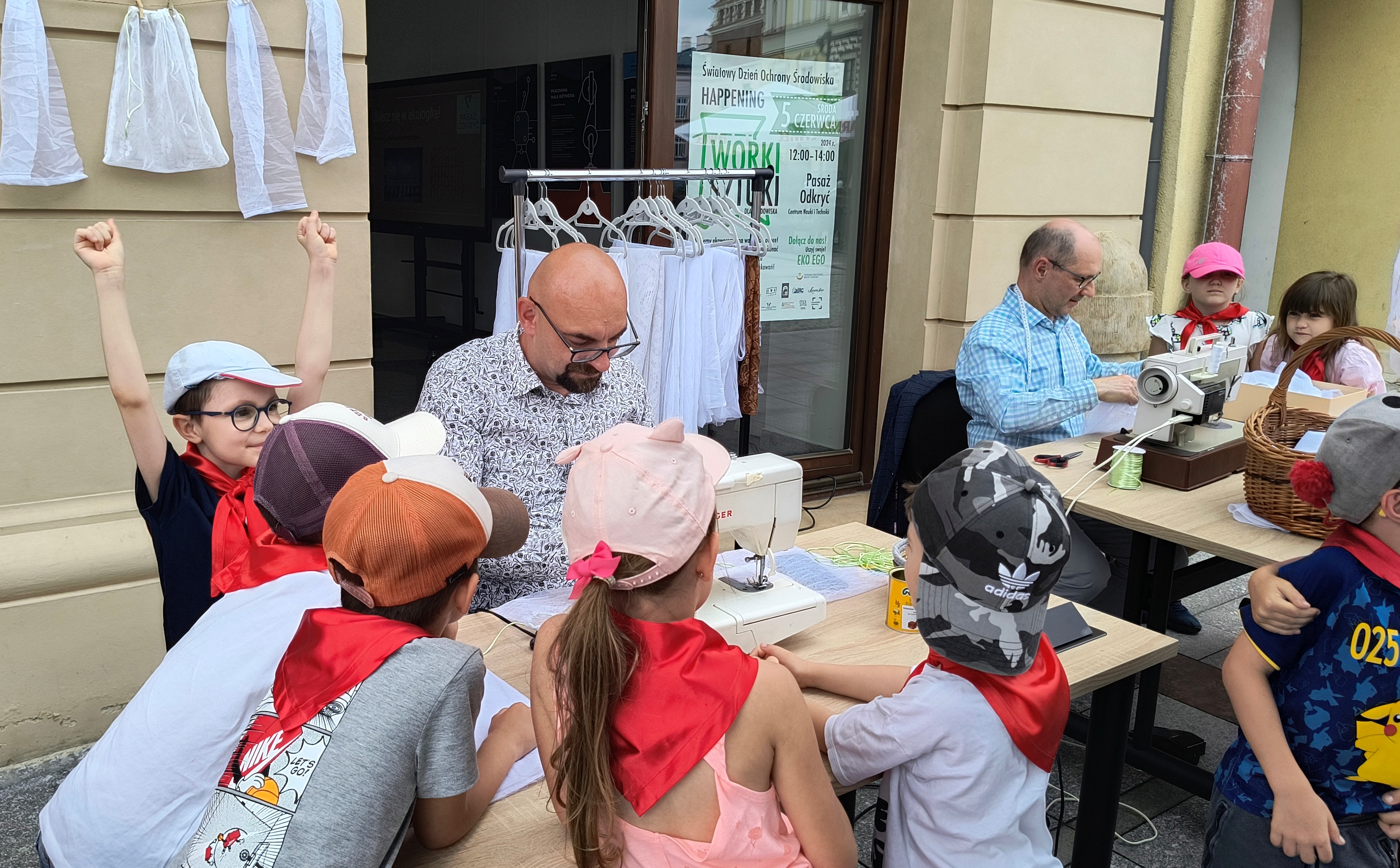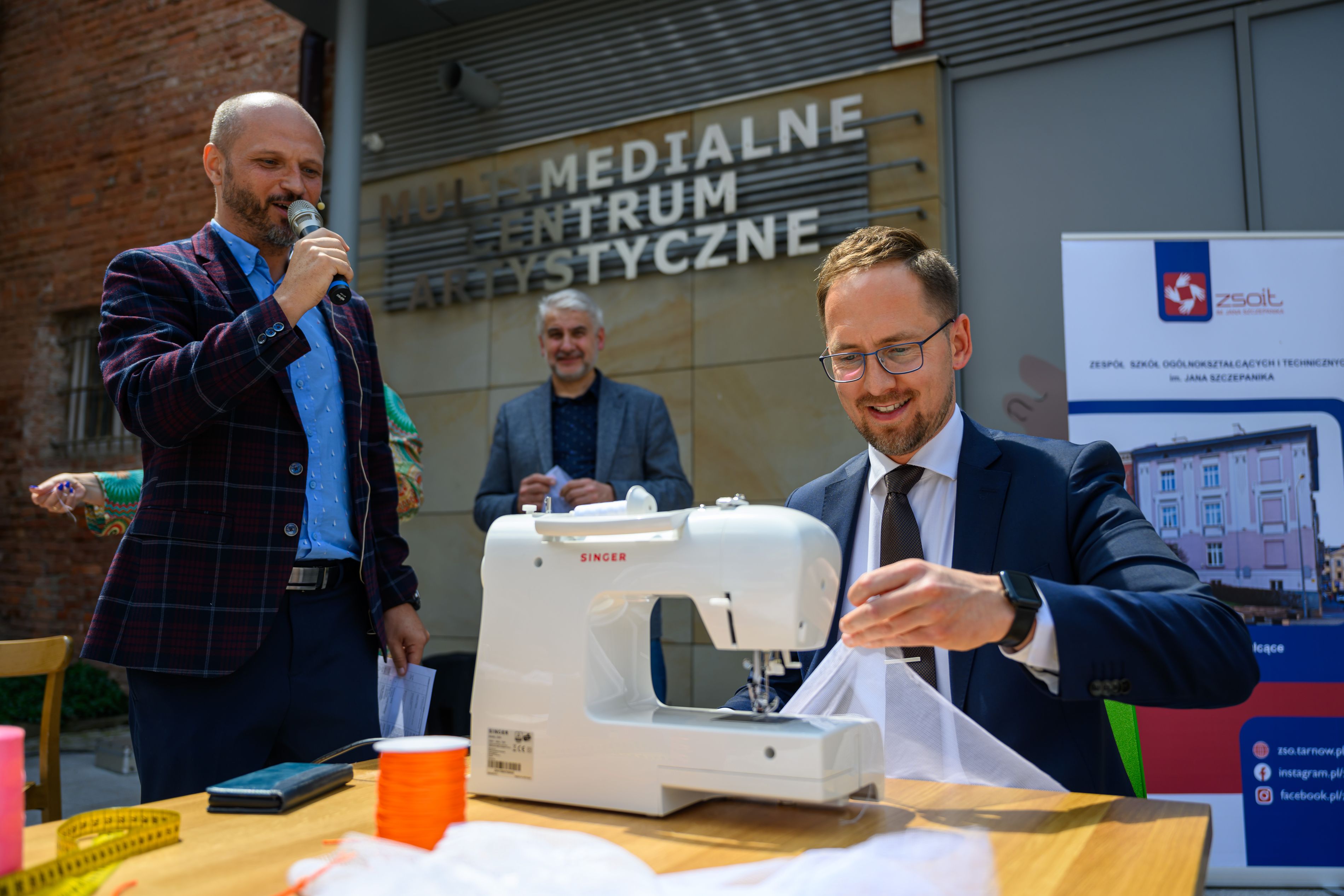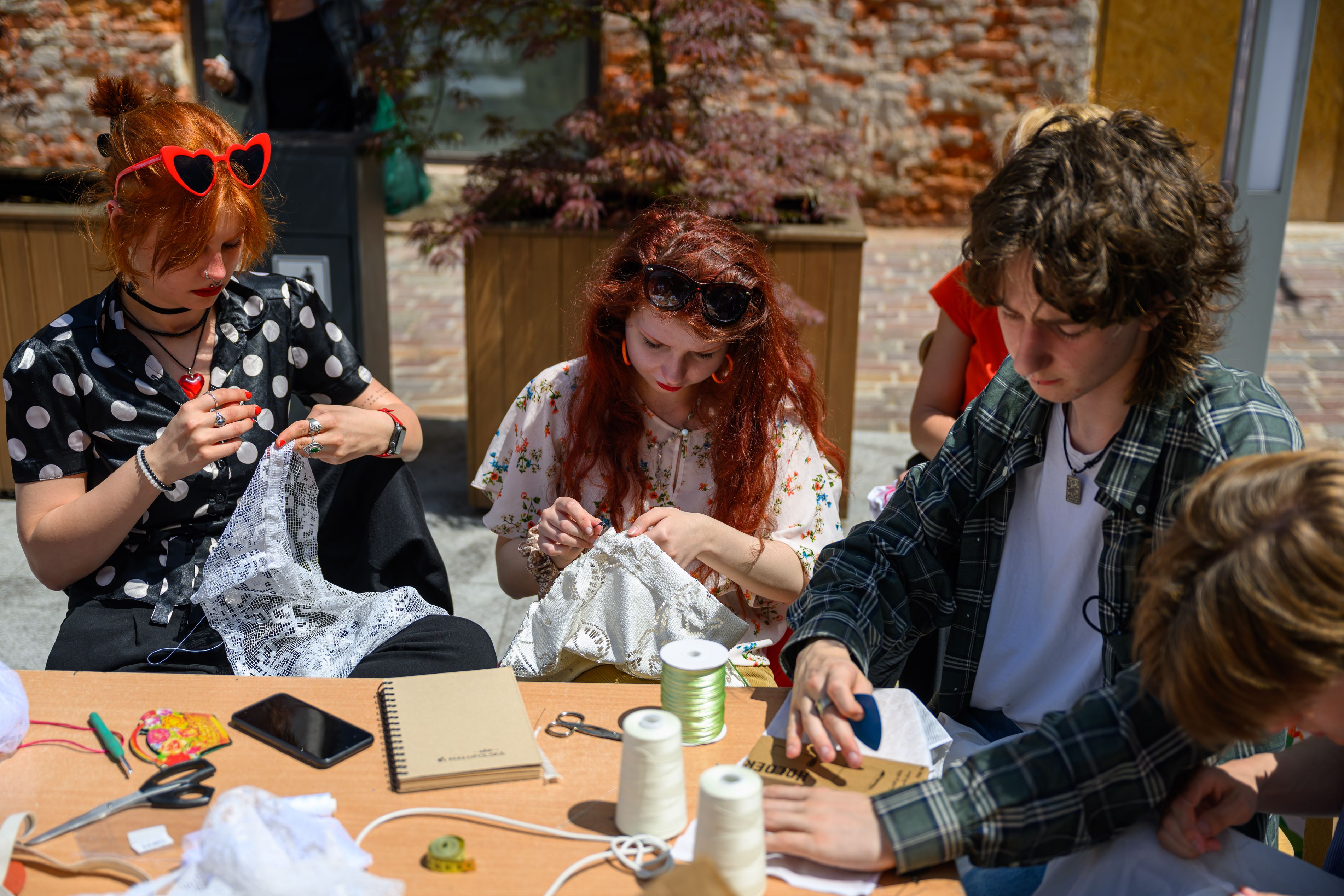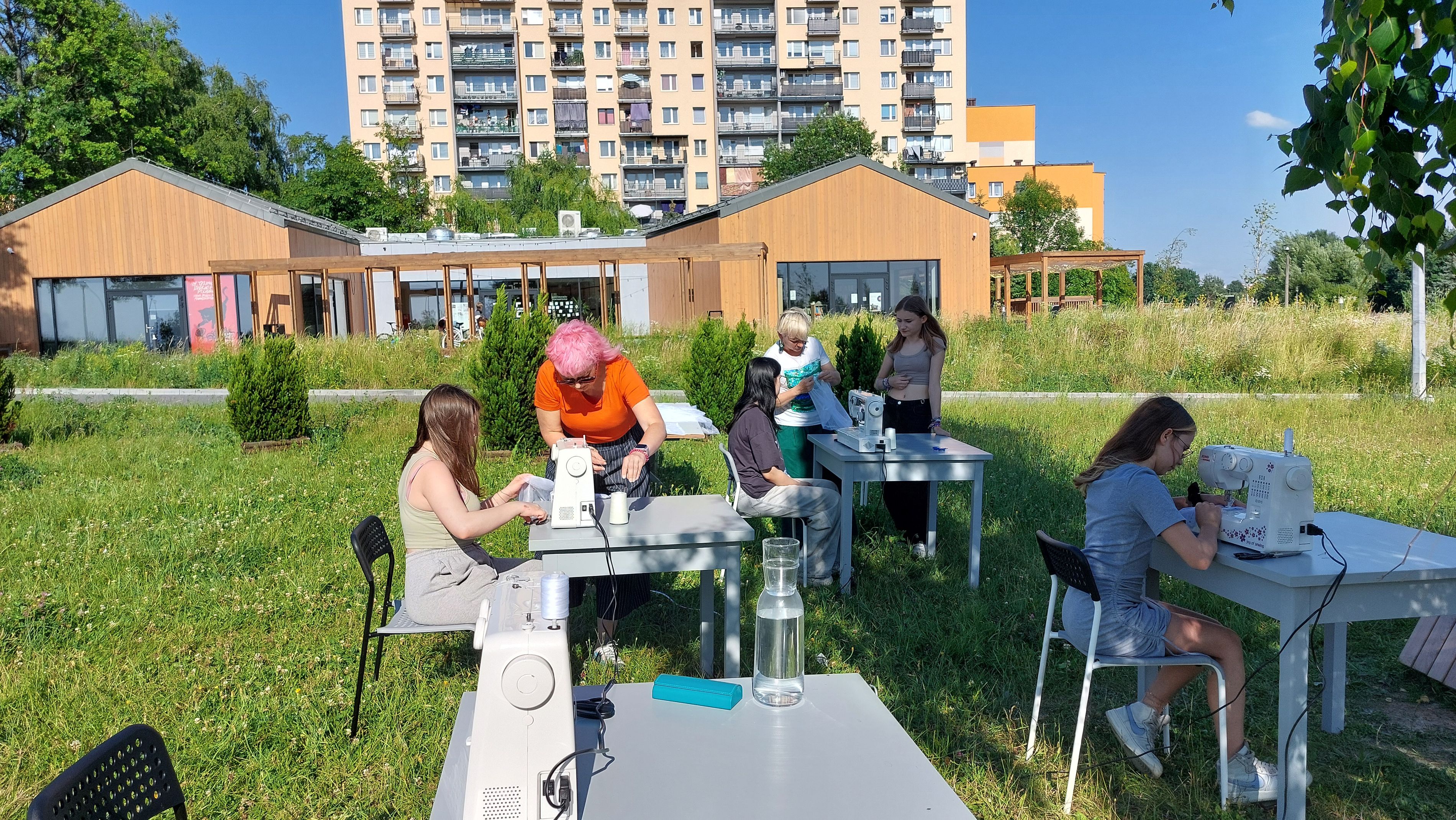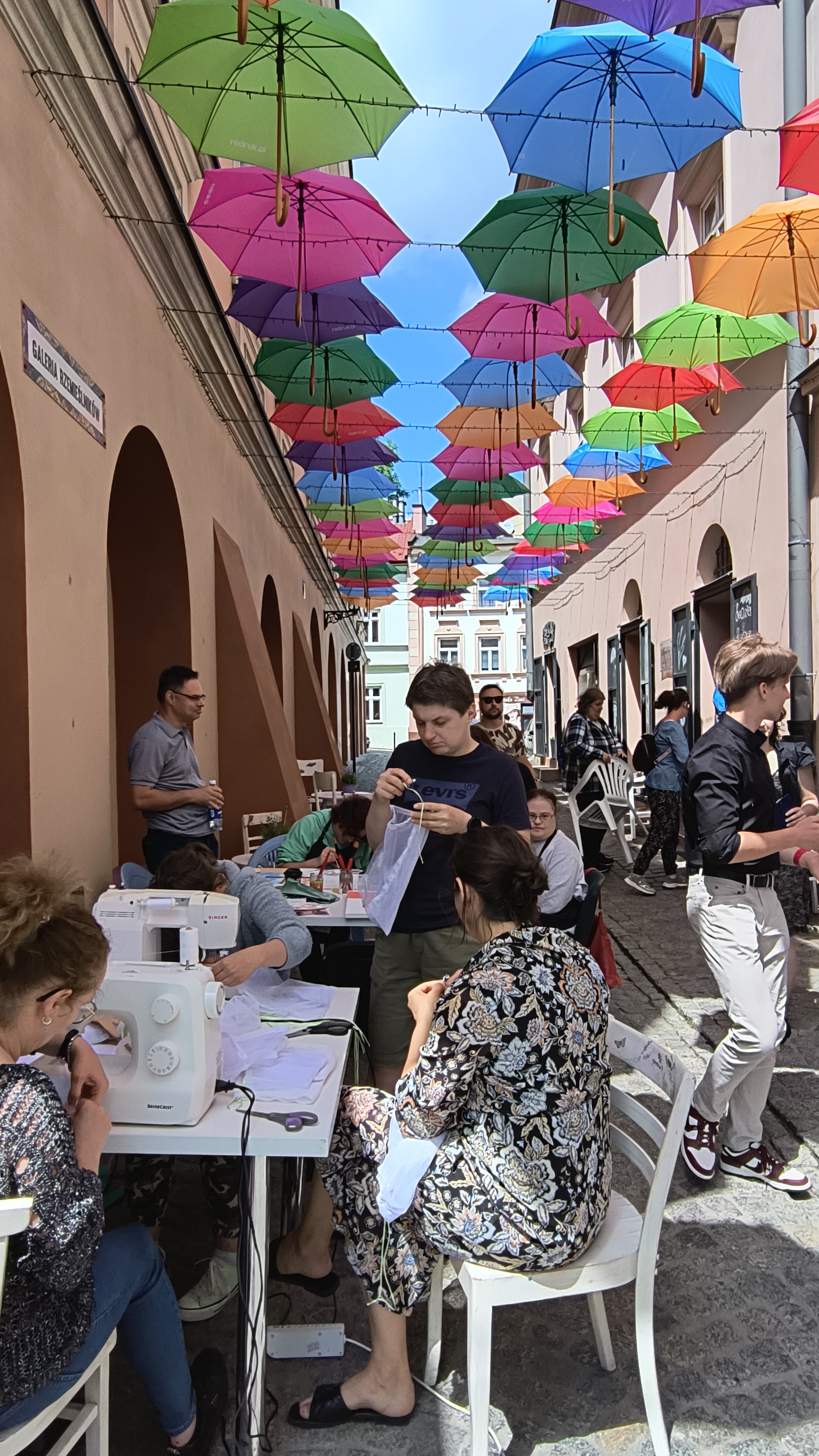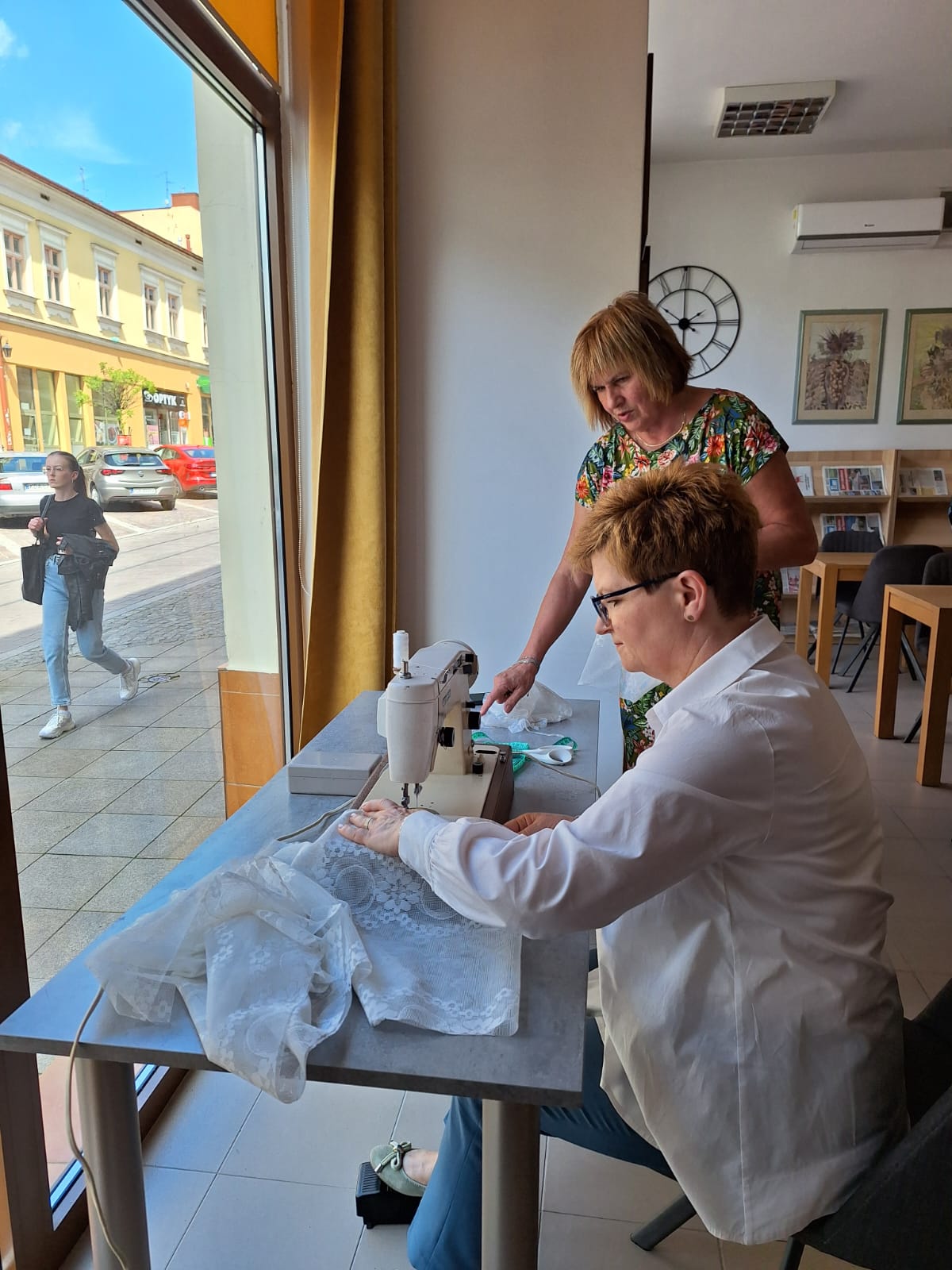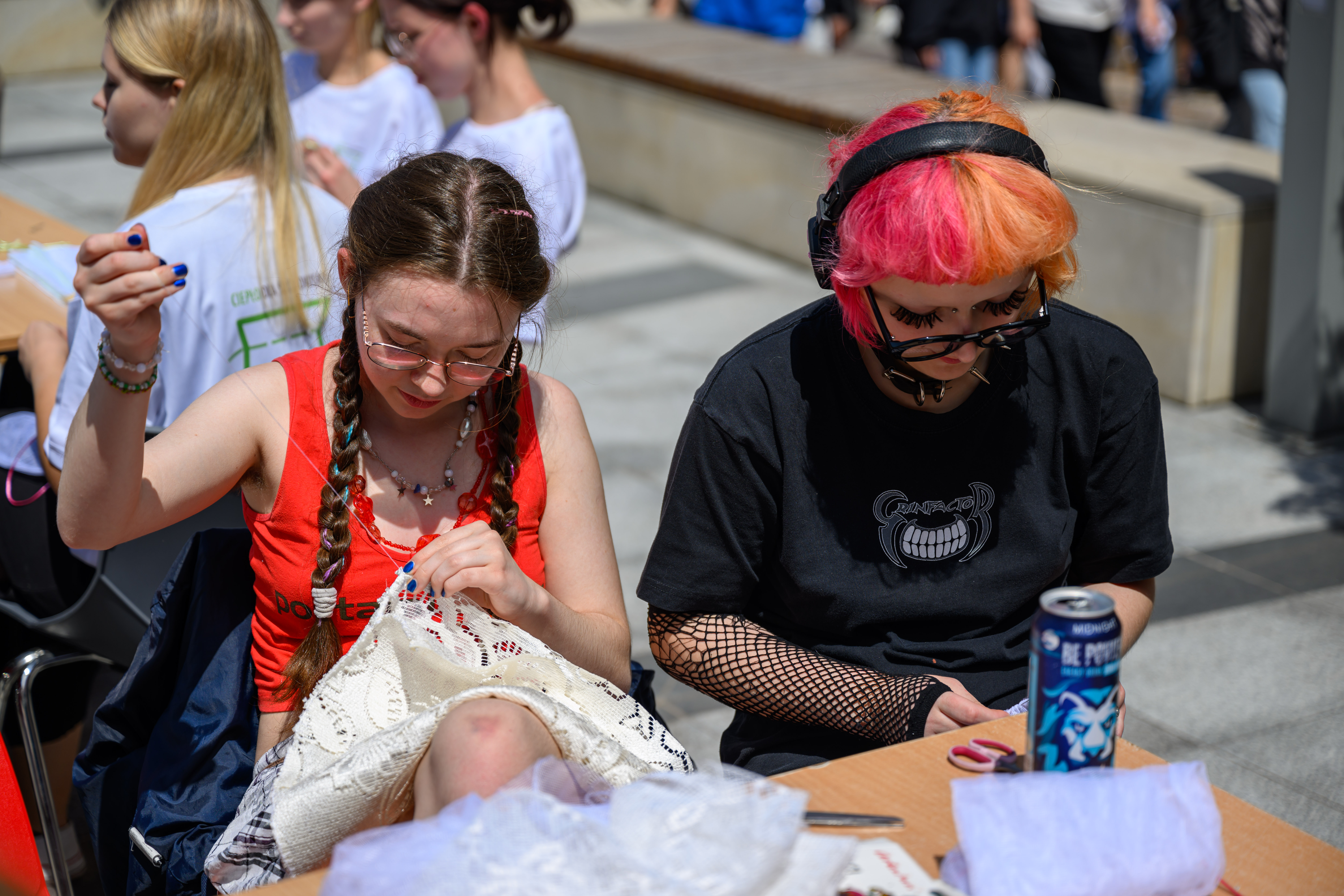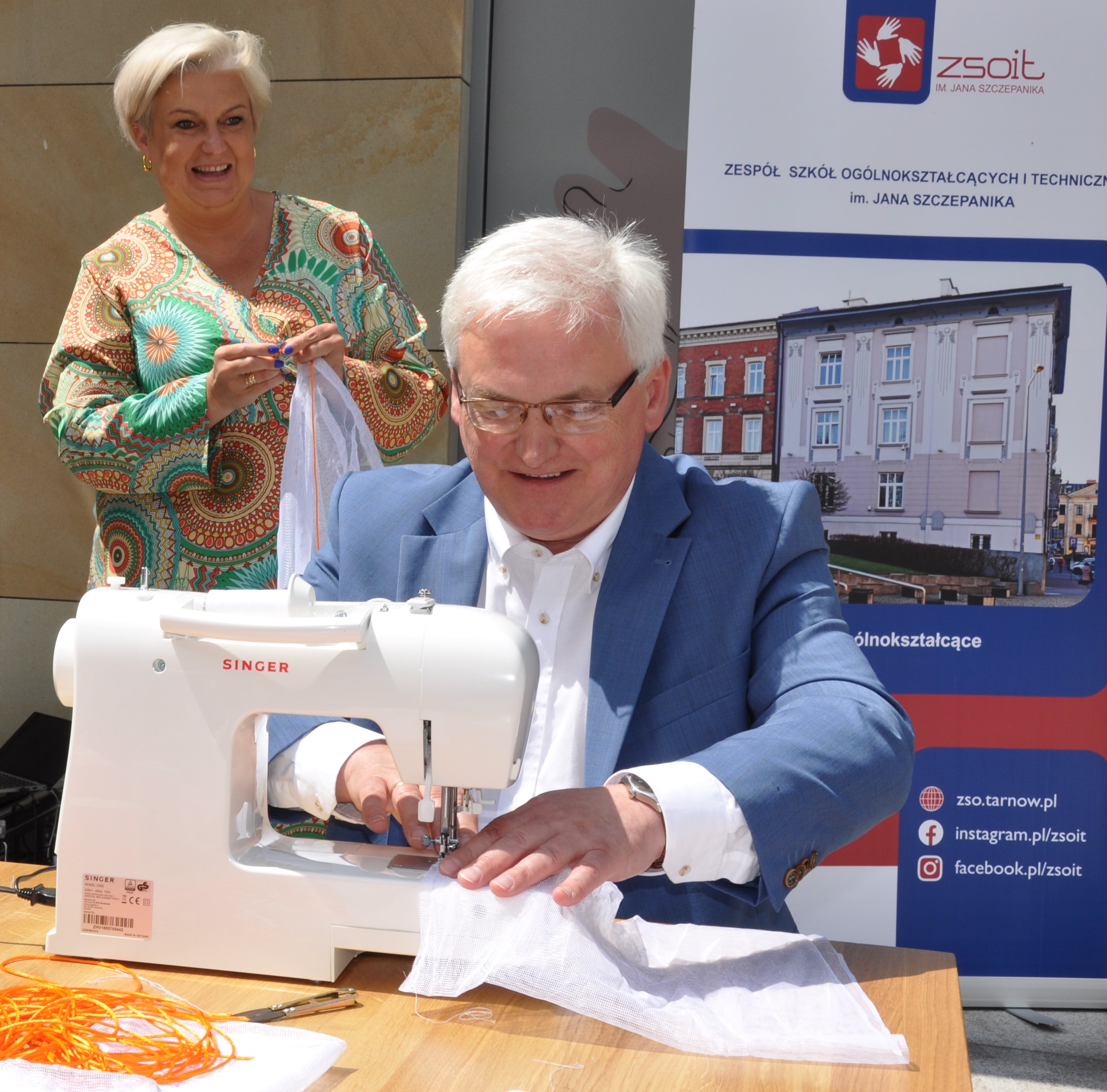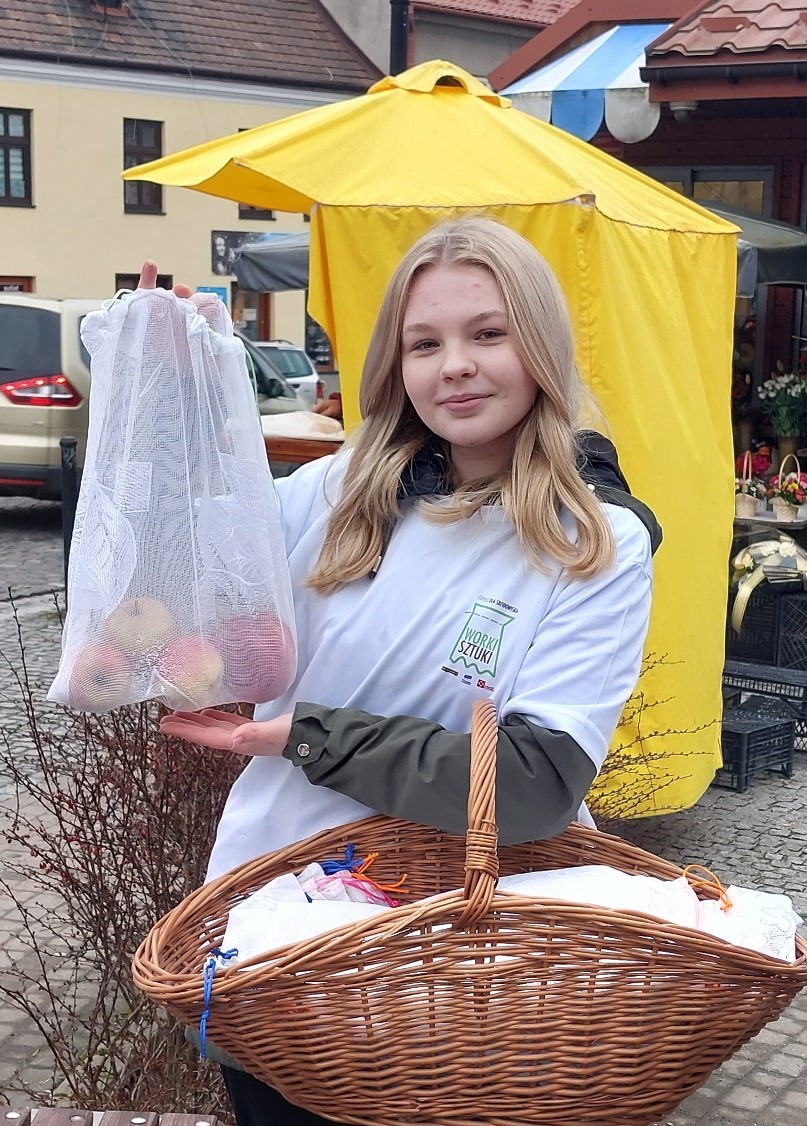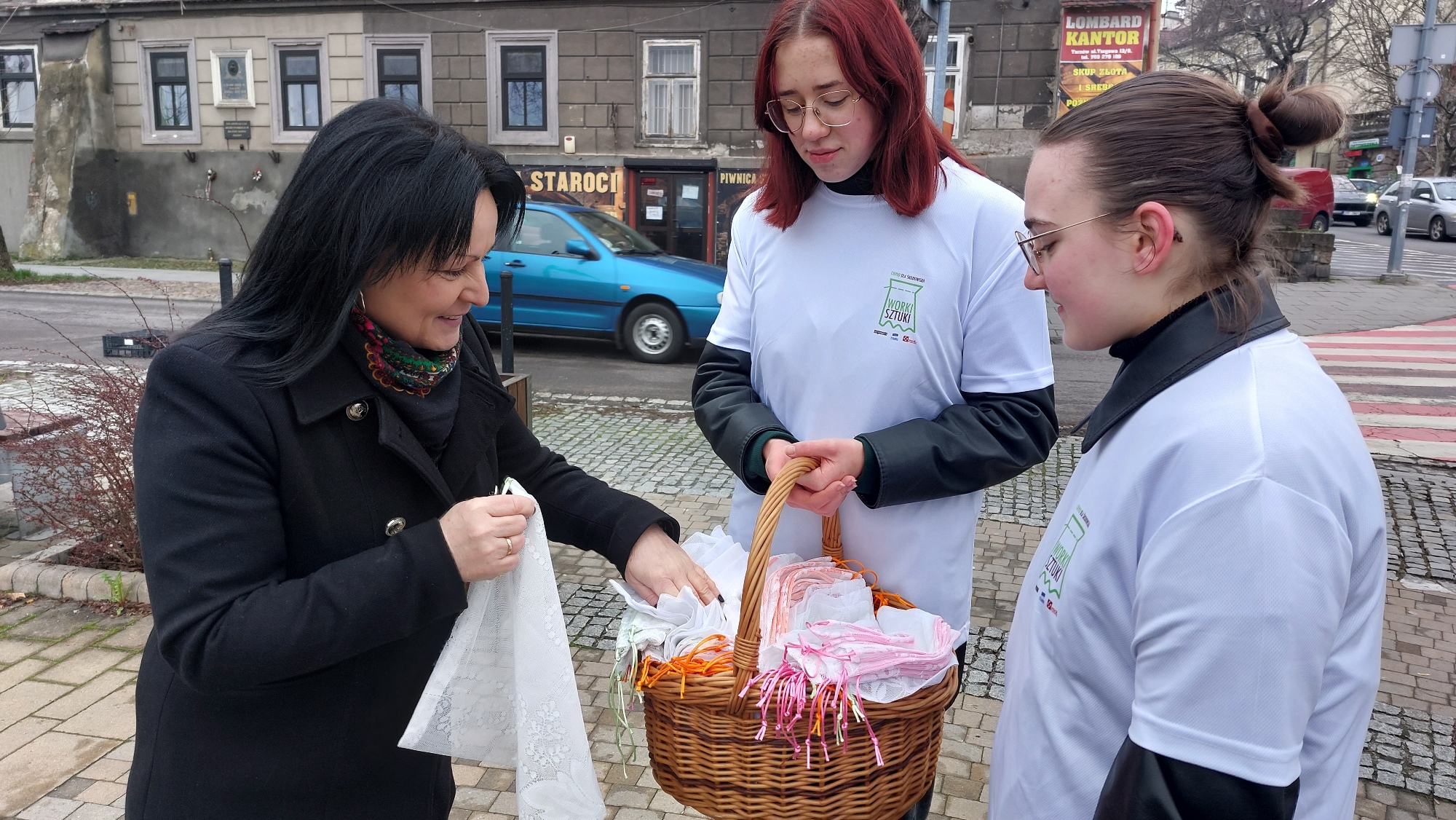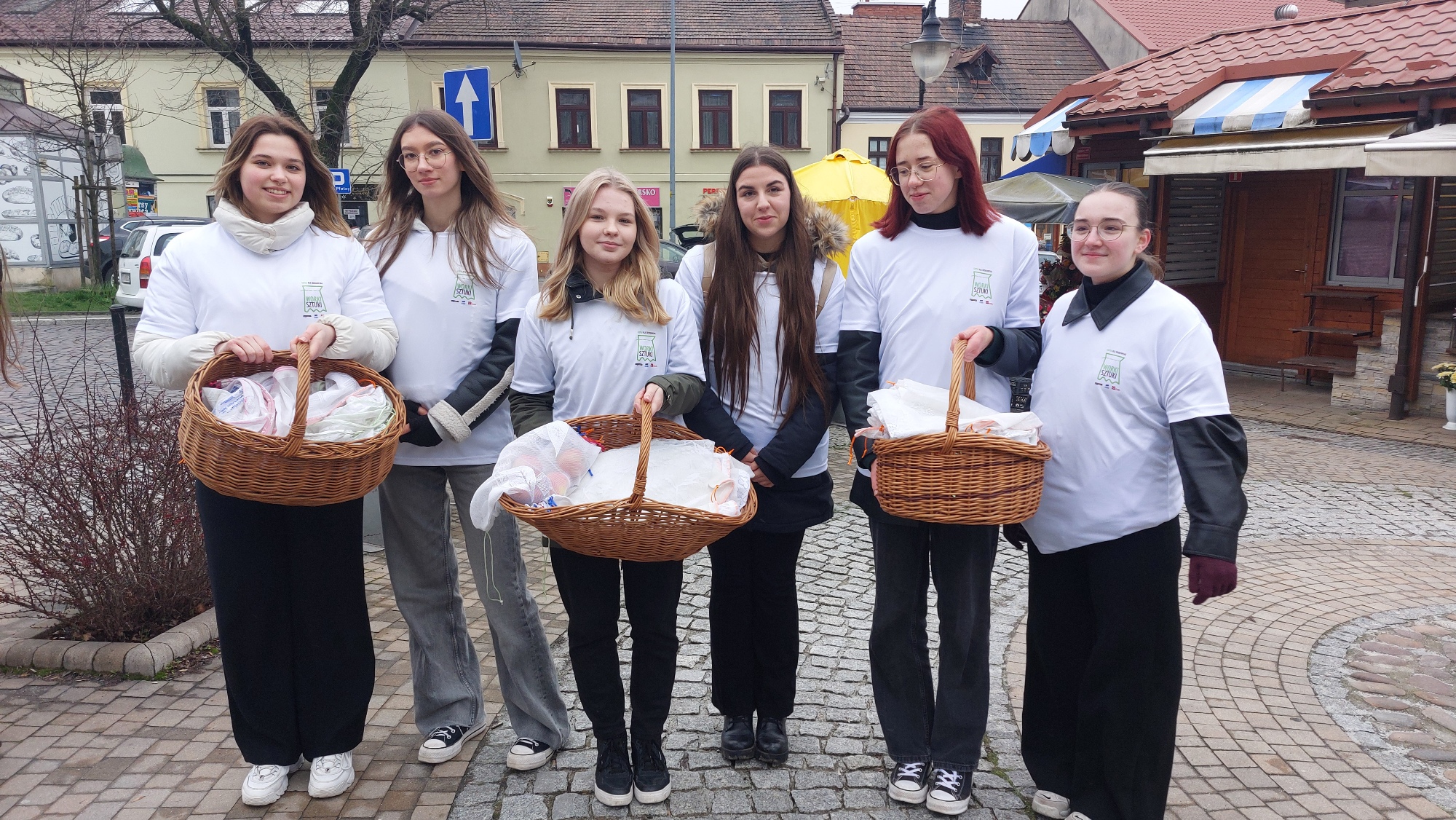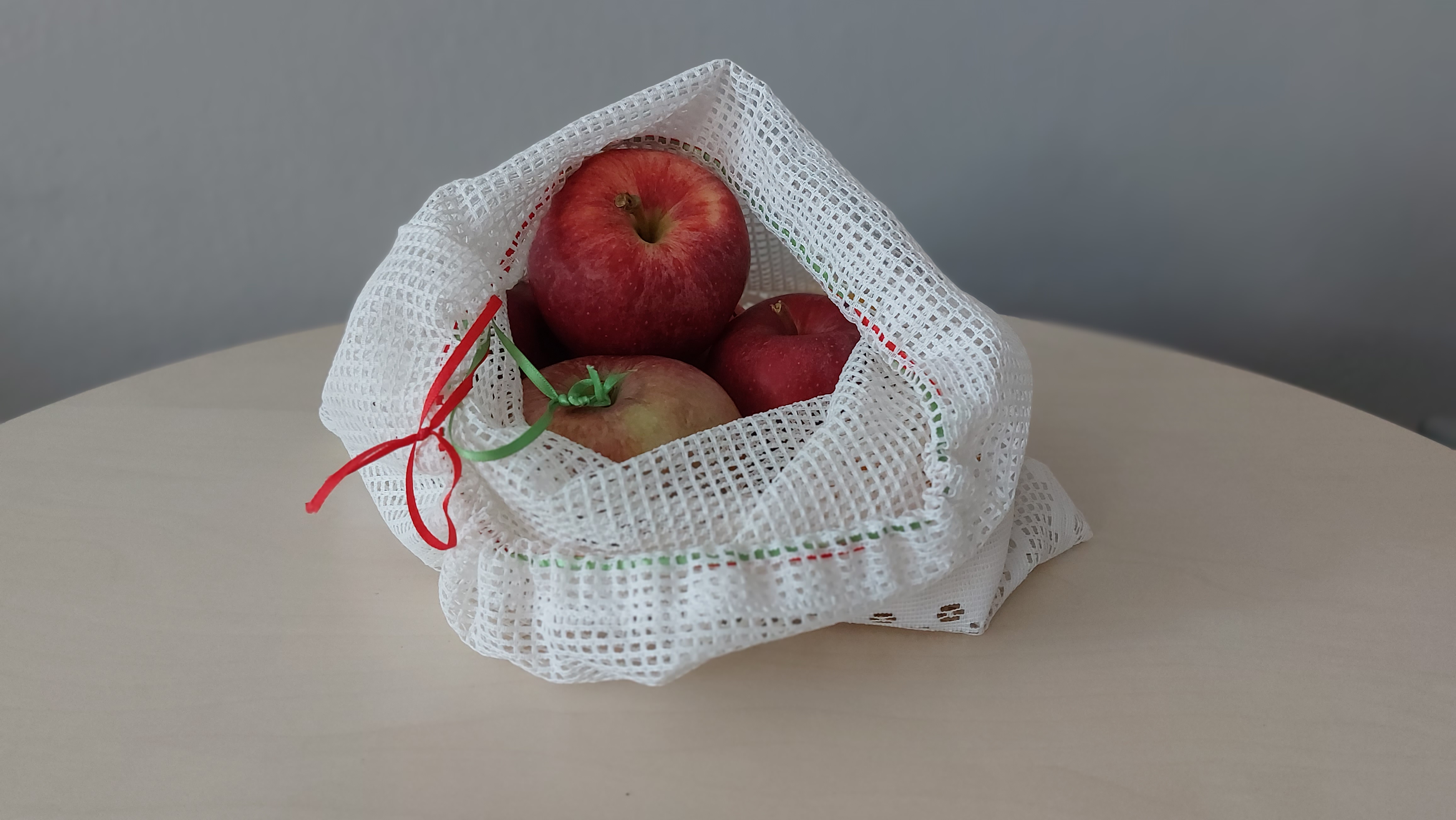Shaping a circular industrial ecosystem and supporting life-cycle thinking
Bags of Art!!
Bags of Art! Make your own Eco Ego!
They sewed thousands of reusable bags for vegetables and fruits from old net curtains! They reduced the use of plastic packaging! The Polish city of Tarnów organized a unique ecological campaign - Bags of Art. Its residents sewed reusable eco bags for shopping on the streets and taught passers-by how to make them themselves. The rhythmic clatter of sewing machines could be heard on every street! With Bags of Art, anyone can sew an eco bag and create their own Eco Ego! For our green future!
Poland
Local
Tarnów
It addresses urban-rural linkages
It refers to other types of transformations (soft investment)
Yes
2024-06-05
No
No
No
As a representative of an organisation, in partnership with other organisations
Bags of Art is an ecological campaign aimed at promoting the reduction of plastic consumption and the use of materials in a closed circuit among the residents of Tarnów and the Małopolska region. The campaign was also aimed at popularizing creative methods of recycling materials, counteracting environmental devastation, loss of biodiversity and the climate change. Unique and durable bags for vegetables and fruits were sewn from old net curtains collected from the residents of Tarnów. The use of such reusable bags during shopping significantly reduces the use of disposable plastic bags. Bags of Art integrated the local environment, shaping engagement and intergenerational social responsibility for the natural environment. The campaign was conducted in two stages: first, during the period from October 2023 to March 2024, young people from the Szczepanik School in Tarnów made 1,330 bags (the number referred to the year of Tarnow’s incorporation). On the 694th anniversary of the foundation of Tarnów, on 7 March 2024, the eco-bags were distributed among the residents. In the second stage, on 5 June 2024, on the World Environment Day, sewing machines were placed outside in the streets of Tarnów next to eight institutions of science, culture and art, where famous Tarnów residents, seniors and students taught residents how to sew eco-bags. The project was commented on a continuous basis by the media. Bags of Art combined NEB values in a special way: by promoting recycling - they supported the development of the idea of goods living in a closed circuit, promoting the reduction of plastic consumption - they contributed to the protection of biodiversity and combating climate change, all generations of Tarnów residents were actively involved in the project, over two thousand unique artistic and functional bags were sewn, which are used by Tarnów residents. The project developed the residents’ sensitivity to reducing the use of plastic and making purchases in reusable bags.
Reduction of the use of plastic
Care for biodiversity and environmental responsibility
Promotion of creative recycling
Intergenerational integration and involving different social groups in active participation in the project
Strengthening the sense of social belonging
The Bags of Art project aimed to promote the reduction of consumption and reuse of materials in a closed circuit. In the case of the Bags of Art campaign, it was presented how to make lightweight, reusable bags for vegetables and fruit from old, unneeded net curtains for everyday shopping (instead of disposable plastic packaging). By demonstration techniques for sewing such bags in public places, it was also promoted to take conscious actions and shape habits in everyday life focused on environmental protection and care for natural biodiversity.
Reusable bags were made from net curtains of various patterns and textures. People sewing the bags cut pieces of fabric so that each bag had an attractive decorative part of the curtain. The strings used to tie up the bags were selected to match the texture and shades of the fabrics. Attention was paid to ensure that the bags were not only useful, but also aesthetically and design-wise attractive, so that using them would be a pleasure. The residents who donated the curtains expressed their satisfaction that they would get a second life, some joked that they would look out for their curtains when shopping - to see if anyone was using them. Some of these people also appeared at the campaign happenings to receive a sewn bag. Thanks to the huge media involvement in informing about the project, many residents of the city and region enthusiastically participated in the Bags of Art campaign.
Bags of Art integrated several generations of Tarnów residents and residents of the region from various social and professional groups. Everyone could take part in the project, and the bags were sewn during the happenings together by seniors, young people, scientists, journalists, people with disabilities, engineers, people from groups at high risk of social exclusion, politicians, artists, men and women, everyone regardless of age, gender, origin and social status. Everyone could join this sewing family from Tarnów on equal terms and feel needed. Some of the young people and seniors sewed the bags by hand. Sharing practical sewing tips encouraged conversations and the development of social interactions. Many young people learned hand and machine sewing for the first time during the campaign. The experiences they gained during Bags of Art strengthened their sense of agency and the desire to share their newly acquired skills with their peers and colleagues.
In September 2023, during a press conference launching the Bags of Art, the campaign's goals and collection points for old net curtains needed to sew reusable bags were publicly announced. The media immediately ran many publications and interviews about the campaign. The first curtains collection was a big success. Senior residents of Tarnów responded to the call with enthusiasm and delivered over half a thousand sq. meters of uneeded net curtain fabrics. Over the following weeks, residents brought nearly three thousand sq meters of curtains to the campaign organizers' offices. Thanks to the media's involvement, information about the campaign reached other regions of Małopolska, thanks to which residents of the region also delivered curtains for the bags. A family-owned company from Tarnów dealing with ecological cleaning of fabrics, PERS Ecological Cleaner’s, also got involved in the campaign, washing all the curtains free of charge before giving them to students to sew the bags. In the first phase of the project, students of fashion industry classes from the Szczepanik School in Tarnów sewed 1,330 unique, reusable bags for vegetables and fruits from curtains (which is also the year of Tarnów's incorporation). On 7 March 2024, on Tarnów's 694th birthday, students handed out bags to residents, informing them at the same time about the need to reduce the use of plastic in everyday life. Then, on 5 June 2024, on the World Environment Day, a happening called Bags of Art for the Environment took place, during which representatives of various social groups, including students, seniors, members of associations, artists, scientists, journalists and politicians, as well as people with special needs, got involved in sewing the bags. In eight public places in Tarnów, they presented residents with methods of making curtain bags, and handed over the bags they sewed to passers-by. The participation of important people additionally strengthened interest in the campaign's goals.
The Bags of Art campaign was organized by MPEC S.A. in Tarnów and the Szczepanik School in Tarnów. Magdalena Drobot from MPEC S.A. in Tarnów is the author of the concept and coordinator of the Bags of Art. MPEC S.A. was the leader and coordinator of the project, covered the costs of organizing the campaign, including the production and broadcast of promotional media materials, the purchase of sewing accessories necessary for sewing, and was responsible for the administrative and organizational side of the campaign. The youth and teachers from the Szczepanik School sewed over 1,330 bags, organized a happening to distribute bags to residents on 7 March 2023, and co-created the Bags of Art for the Environment happening on 5 June 2024. PERS ecological cleaner’s from Tarnów washed every curtain fabric donated by residents, from which eco-bags were sewn. Eight institutions of science, culture and art in Tarnów were involved in the organization of the happening on June 5, 2024: Westerplatte Cultural Center, Aniołowo - Gallery of Disabled Artists, Municipal Public Library, Multimedia Art Center, Pasaż Odkryć Center for Science and Technology, Youth Palace, Ludwik Solski Theater in Tarnów, SOFA Café. Each of these institutions organized stands with sewing machines, on which famous residents of Tarnów sewed bags. Other social environments got involved in the organization of the happening on 5 June 2024: seniors from the Siemacha Association, women from the Wspól-dzielnia Women's Association, therapists and students of Occupational Therapy Workshops, youth and teachers from the Fine Arts High School, key city officials, scientists, journalists and politicians, among others. Member of the Polish Parliament Urszula Augustyn, Deputy Marshal of the Małopolska Voivodeship Józef Gawron and Mayor of Tarnów Jakub Kwaśny – all of them personally sewed bags for residents. Each of these public figures and institutions promoted the project through their own information channels.
The Bags of Art project was organized by an interdisciplinary team of institutions and public figures operating in the city of Tarnów. Institutions of science, culture and art, public figures, businesses, associations, support institutions for people with special needs and the media were invited to participate in the project at various stages of its implementation. Each of the partners brought to the project their individual substantive potential in the fields of environmental education for sustainable development, technical education, recycling, methods of education and therapy, social integration and activation of excluded groups, among others. This makes Bags of Art a multidisciplinary project.
The Bags of Art project used fabric cutting and sewing techniques, creative material processing and creating unique product designs. The information content of the campaign and the issues raised by the organizers in the media aimed to popularize issues related to ecology, environmental protection, the need to reduce plastic and material recycling. It explained what the life cycle of products in a closed circuit is and what its material and non-material value is. During the happening (5th June 2024), private sewing machines of individual participants were used. Several of the participants repaired their old machines specifically for the happening and have been using them anew since.
The campaign also used knowledge from the field of social psychology and the benefits resulting from the integration of various social groups, e.g. cooperation between seniors and young people to achieve common goals for the local community. Issues from the pedagogical, therapeutic and resocialization areas, the impact of group work, learning practical skills in shaping a sense of agency and development benefits for people affected by exclusion resulting from involvement in team and intergenerational activities were also important in organizing the campaign.
The Bags of Art project used fabric cutting and sewing techniques, creative material processing and creating unique product designs. The information content of the campaign and the issues raised by the organizers in the media aimed to popularize issues related to ecology, environmental protection, the need to reduce plastic and material recycling. It explained what the life cycle of products in a closed circuit is and what its material and non-material value is. During the happening (5th June 2024), private sewing machines of individual participants were used. Several of the participants repaired their old machines specifically for the happening and have been using them anew since.
The campaign also used knowledge from the field of social psychology and the benefits resulting from the integration of various social groups, e.g. cooperation between seniors and young people to achieve common goals for the local community. Issues from the pedagogical, therapeutic and resocialization areas, the impact of group work, learning practical skills in shaping a sense of agency and development benefits for people affected by exclusion resulting from involvement in team and intergenerational activities were also important in organizing the campaign.
For the first time on such a large scale, it was possible to socially engage so many people, institutions, organizations, enterprises and media outlets in Tarnów to participate and co-create a non-profit campaign aimed at promoting values related to limiting the use of plastic, protecting biodiversity, counteracting environmental devastation and climate change. The project did not implement new innovative technologies, its innovativeness consisted in the cooperation of so many different social groups focused on values related to protecting the natural environment. Each person and institution brought their unique personality and character to this project. Despite differences in political views, social and intellectual status, positions and professional roles - all participants of Bags of Art integrated around one goal - the green transformation of the European lifestyle and economy. During the project events, there was an extraordinary, joyful and positive atmosphere, which can be seen in every media report. Bags of Art also highlighted the value of developing basic skills in the younger generation of Europeans related to fabric repair and product recycling, striving for the rebirth of crafts, artistic creation and cultivating the value of social cooperation.
In order to develop environmental awareness leading to a lasting change in consumption habits (including limiting the use of natural resources, reducing the use of plastics and a creative use of closed-loop items), it is not enough to provide theoretical knowledge about environmental risks and ways to counter them. It remains extremely important to shape involvement at the emotional level and to support the development of practical skills, including the ability to creatively process products in a closed circuit. Only informed and active public involvement offers hope for lasting change and environmental protection. To combat climate change. we need intergenerational solidarity and social cooperation. This premise is the genesis of the Bags of Art campaign. Therefore, the organizers activated residents to donate old curtains and encouraged representatives of different social groups to cooperate and sew bags together in public. In the process, everyone, regardless of social status and age, became a part of a community with the goal of promoting the reduction of plastic consumption and the closed circuit life cycle of products.
The Bags of Art campaign was organized in the form of practical workshops on cutting and sewing techniques and educational happenings, integrating various environments and social groups around the issues of innovative processing of unnecessary materials, reducing the use of plastic and protecting the environment. The project was promoted using radio advertisements, television interviews, articles and press advertisements, and promotion on the Internet (advertisements and articles, social media). A television tutorial was produced, presenting how to make a reusable bag for vegetables and fruit from net curtains, step by step.
The Bags of Art project was a public manifestation of creative recycling, the closed circuit life cycle and environmental protection through the elimination of plastic in everyday life.
The Bags of Art campaign was organized in the form of practical workshops on cutting and sewing techniques and educational happenings, integrating various environments and social groups around the issues of innovative processing of unnecessary materials, reducing the use of plastic and protecting the environment. The project was promoted using radio advertisements, television interviews, articles and press advertisements, and promotion on the Internet (advertisements and articles, social media). A television tutorial was produced, presenting how to make a reusable bag for vegetables and fruit from net curtains, step by step.
The Bags of Art project was a public manifestation of creative recycling, the closed circuit life cycle and environmental protection through the elimination of plastic in everyday life.
Bags of Art is a universal project. Each element of the project can be implemented in other places, social groups and contexts. The dream of the organizers is for the Bags of Art project to be used in many other places, and for the World Environment Day to see rattling sewing machines appear in the streets of European cities, with which Europeans will promote the art of creatively processing unnecessary materials or clothing into new products. The innovativeness of the Bags of Art project also lies in this approach.
In order to organize the Bags of Art project you need sewing machines, sewing accessories, old or unnecessary curtains or fabrics, and people, who with commitment, in public places, will demonstrate how to transform unnecessary fabrics into useful products.
In order to organize the Bags of Art project you need sewing machines, sewing accessories, old or unnecessary curtains or fabrics, and people, who with commitment, in public places, will demonstrate how to transform unnecessary fabrics into useful products.
The Bags of Art project contributed to the promotion of reducing the use of plastic in everyday life and sensitizing the local community to the values related to counteracting the devastation of the natural environment and climate change on a micro and macro scale. The project's ideological spaces also included content related to the need to limit the fast fashion industry, the need for product durability, the promotion of creativity and creative processing of materials in a closed circuit. All activities of the Bags of Art project were aimed at sensitizing people to the need to care for the natural environment and reasonable management of resources.
The Bags of Art campaign involved representatives of practically all social and professional groups in Tarnów and the region in the issue of the need to eliminate plastic in everyday life. It integrated residents around the process of transforming everyday shopping habits and reducing the use of disposable plastic packaging.
The collection of curtains needed to be processed into reusable bags made residents aware of the environmental and social values that can be derived from the promotion of a circular economy, also on a local scale.
The campaign also achieved success thanks to the huge interest of the media, which presented the goals, social and environmental values of the Bags of Art campaign. The media significantly influenced the involvement of residents in the implementation of the project, disseminating knowledge about environmental protection and promoting values from the development of initiatives based on closed circulation. Over 100 articles and interviews about the Bags of Art campaign and its goals were published in the regional media (press, radio, television and the Internet).
Nearly 150 non-profit individuals were directly involved in the creation of the project. Over three thousand sq. meters of net curtains were collected, from which over two thousand reusable bags for vegetables and fruits were made.
In Tarnów shops, you can increasingly often meet people using reusable bags when shopping.
The Bags of Art campaign received the title of the best Eco Initiative of Małopolska in the Eko Hero Małopolska 2023 plebiscite organised by the Marshal's Office of the Małopolska Voivodeship and Gazeta Krakowska.
The collection of curtains needed to be processed into reusable bags made residents aware of the environmental and social values that can be derived from the promotion of a circular economy, also on a local scale.
The campaign also achieved success thanks to the huge interest of the media, which presented the goals, social and environmental values of the Bags of Art campaign. The media significantly influenced the involvement of residents in the implementation of the project, disseminating knowledge about environmental protection and promoting values from the development of initiatives based on closed circulation. Over 100 articles and interviews about the Bags of Art campaign and its goals were published in the regional media (press, radio, television and the Internet).
Nearly 150 non-profit individuals were directly involved in the creation of the project. Over three thousand sq. meters of net curtains were collected, from which over two thousand reusable bags for vegetables and fruits were made.
In Tarnów shops, you can increasingly often meet people using reusable bags when shopping.
The Bags of Art campaign received the title of the best Eco Initiative of Małopolska in the Eko Hero Małopolska 2023 plebiscite organised by the Marshal's Office of the Małopolska Voivodeship and Gazeta Krakowska.

